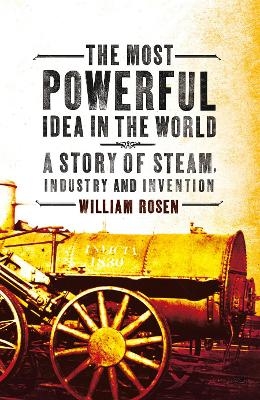
The Most Powerful Idea in the World
A Story of Steam, Industry and Invention
Seiten
2011
Pimlico (Verlag)
978-1-84595-135-1 (ISBN)
Pimlico (Verlag)
978-1-84595-135-1 (ISBN)
A history of the Industrial Revolution and the steam engine, as well as an account of how inventors first came to own and profit from their ideas and how invention itself springs forth from logic and imagination. It takes us into the human mind, explaining how 'eureka' moments occur - when the brain is most relaxed.
'The most important invention in the whole of the Industrial Revolution was invention itself.'
Those words are at the heart of this remarkable book - a history of the Industrial Revolution and the steam engine, as well as an account of how inventors first came to own and profit from their ideas and how invention itself springs forth from logic and imagination.
Rocket. It was the fortuitously named train that inaugurated steam locomotion in 1829, jump-starting two centuries of mass transportation. As William Rosen reveals, it was the product of centuries of scientific and industrial discovery. From inventor Heron of Alexandria in AD 60 to James Watt, the physicist whose 'separate condenser' was central to the development of steam power - all those who made possible the long ride towards the Industrial Revolution are brought to life.
But crucial to their contributions are other characters whose concepts allowed their invention to flourish - John Locke and intellectual property; Edward Coke and patents. Along the way, Rosen takes us deep into the human mind, explaining how 'eureka' moments occur - when the brain is most relaxed.
'The most important invention in the whole of the Industrial Revolution was invention itself.'
Those words are at the heart of this remarkable book - a history of the Industrial Revolution and the steam engine, as well as an account of how inventors first came to own and profit from their ideas and how invention itself springs forth from logic and imagination.
Rocket. It was the fortuitously named train that inaugurated steam locomotion in 1829, jump-starting two centuries of mass transportation. As William Rosen reveals, it was the product of centuries of scientific and industrial discovery. From inventor Heron of Alexandria in AD 60 to James Watt, the physicist whose 'separate condenser' was central to the development of steam power - all those who made possible the long ride towards the Industrial Revolution are brought to life.
But crucial to their contributions are other characters whose concepts allowed their invention to flourish - John Locke and intellectual property; Edward Coke and patents. Along the way, Rosen takes us deep into the human mind, explaining how 'eureka' moments occur - when the brain is most relaxed.
William Rosen was a senior executive at Macmillan and Simon & Schuster publishing houses for more than twenty-five years, working with authors including Bernard Lewis, Felipe Fernandez-Armesto, Philip Craig and Tim Clayton, Marina Benjamin, and Robert Lacey. He lives in Princeton, New Jersey.
| Erscheint lt. Verlag | 2.6.2011 |
|---|---|
| Verlagsort | London |
| Sprache | englisch |
| Maße | 153 x 234 mm |
| Gewicht | 481 g |
| Themenwelt | Geschichte ► Allgemeine Geschichte ► Neuzeit (bis 1918) |
| Geschichte ► Teilgebiete der Geschichte ► Wirtschaftsgeschichte | |
| Sozialwissenschaften | |
| ISBN-10 | 1-84595-135-2 / 1845951352 |
| ISBN-13 | 978-1-84595-135-1 / 9781845951351 |
| Zustand | Neuware |
| Haben Sie eine Frage zum Produkt? |
Mehr entdecken
aus dem Bereich
aus dem Bereich
Giordano Bruno - ein ketzerisches Leben
Buch | Hardcover (2024)
C.H.Beck (Verlag)
CHF 41,85
das dramatische 16. Jahrhundert
Buch | Hardcover (2024)
Rowohlt Berlin (Verlag)
CHF 47,60


